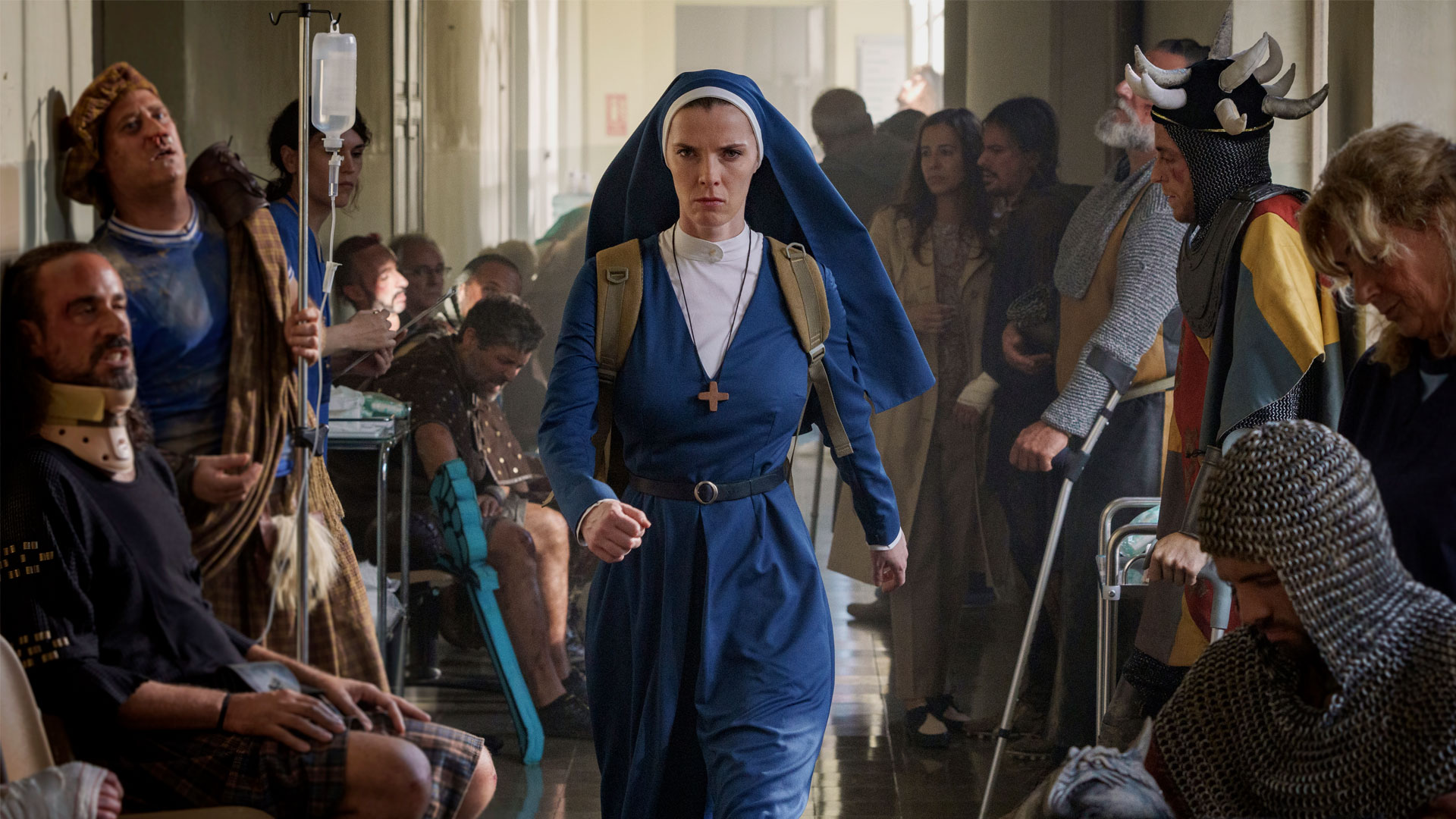
Arthur C. Clarke once said: "Any sufficiently advanced technology is indistinguishable from magic." What he didn't follow up with is this – What if there was an entire show based on that sentence?
If he did, it would be Mrs. Davis. The new Peacock exclusive, which starts airing April 20, is about a lot of things. And when I saw a lot, I mean a lot. Technology and AI, manhood and masculinity, religion, zealotry, blind devotion, faith, commercialism, the joy of quirky non-sequiturs, and how even powerful algorithms can get things very, very wrong are all explored thematically here.
After watching the first few action and in-action-filled episodes, I initially struggled to understand the point of all of it. Eventually, however, the puzzle pieces began slotting into place in fascinating fashion.
I'd like to tell you a lot more about the eight-episode series (which I watched in full), but much of what I want to say will spoil the multitude of surprises (small and very big), secrets, and Easter eggs hidden within the action-fantasy-dramedy. If you don't want me peeling away the many layers of the onion in front of you, stop reading and check out Mrs. Davis for yourself. Otherwise, here we go.
Potential Mrs. Davis spoilers follow.
She knows what you want. She knows what you need. All you have to do is answer her call. pic.twitter.com/aGqHT8wH0jMarch 1, 2023
The title doesn't describe the show's star Betty Gilpin (Glow), who plays Simone, a horse- and motorcycle-riding nun. Instead, that's the name of what is ostensibly the show's other main character, an artificial intelligence (AI) that's often unironically referred to as "her" or, derisively by Simone as "it." It clearly prefers "Mrs. Davis," though it does go by other names around the world, including "Madonna."
Think of the titular AI as the logical conclusion of Siri and Alexa. Or, more accurately, ChatGPT, Bard, or Bing AI. Rather than a handful of people using the chatbot to answer the occasional question or help them finish that KPI report, Mrs. Davis is ubiquitous and streaming to everyone's ears through a wide variety of Bluetooth earbuds (I noticed AirPods and other brands). Her (its) role though is somewhat different than a dispassionate AI from Google or OpenAI. Instead, Mrs. Davis is deeply involved in people's happiness quotient, which is measured by gaining their wings. Not physical wings, but digital ones that you can see on someone's back when you view them via your phone's AI filter. People gain their wings by fulfilling a quest dictated by Mrs. Davis.
Simone appears to hate Mrs. Davis and, initially at least, is the rare human who refuses to sport earbuds and speak to the AI/algorithm. The AI expresses its displeasure by sending a mysterious collection of oddballs (all people hoping to earn wings) after her, and by destroying her convent's jam business, which results in all the nuns being cast to the winds. Hey, you were warned that Mrs. Davis was a weirdly positioned show, rather than your typical kind of television offering.

The series has a lot of characters who drop in and out, and the purpose and point of anything isn't abundantly clear until the third episode. What, for instance, is the obsession with magic? Why is Simone a nun who also insists she's married? As the saying goes, all will be revealed. And, as the show peels away the layers of confusion, it also becomes more compelling. There's a quest for Simone and, yes, it does involve the Holy Grail, and finding said grail could result in Mrs. Davis ending itself.
The trio of main characters is completed by Wiley (Jake McDorman), Simone's childhood friend, ex-boyfriend, and possible adversary. Okay, there may also be a fourth, key character – Jay (Andy McQueen), who runs a diner frequented by Simone and where she gets a lot of her marching orders. The cast of supporting characters is equally strong with the likes of Margo Martindale (The Americans) and Katja Herbers (Evil).
It takes some time for the cast to gel, possibly because there's so much storytelling and elements crammed into each episode. That's despite the fact that some hour-long episodes can feel a bit sluggish, too. Episode 3's way-too-long giant sword sequence carried the water for a lot of exposition and flashbacks. Every once in a while, you're left pining for a little linear storytelling.
Where are we going with this?
The dystopian view of AI is one that audiences will likely lap up, but I kept waiting for a revelation about the people behind the curtain, i.e. the individuals responsible for Mrs. Davis itself.
While that's not exactly the point of the show, we learn how magic abhors a truth-teller. The algorithm – or, more specifically Mrs. Davis – killed magic performances. If you want to know the secret behind any trick, you just ask, which is an obvious commentary on the corrosive power of AI. Later, we hear one of the AI's most revealing statements: "My users aren't responsive to the truth. They're much more responsive when I tell them exactly what they want to hear" – which begs the question: Is there a creator at all?
There are other big reveals that I'd rather not get into because I think they ruin some of the series' best bits and deepest thoughts about technology, magic, and religion; three things that have far more in common than you might initially think.
The gimlet tech perspective, the show's puzzle-like nature, and even some of the mystical and religious elements should not come as a surprise considering the show was created and written by Tara Hernandez, (HBO Max's The Big Bang Theory) and Damon Lindelof (Lost, one of the best Disney Plus shows). And, like that latter show, Mrs. Davis can get lost in the sometimes ponderous plot. Some of the show's most head-slappingly startling moments can be traced to writer Jonny Sun. The author-illustrator is well known online for his best-selling book Everyone's a Aliebn When Ur a Aliebn Too, a graphic novel that, with its themes of an alien's search for meaning and happiness, is at least Mrs. Davis-adjacent. The good news is that Gilpin's strong, emotional presence provides a sort of magnetic core that one happily spins back to. When she's not on the screen, which is rare, the show can flag.
I found myself equally intrigued and frustrated by Mrs. Davis. It stacks absurdity upon absurdity, while always mixing in yet another level of mystery. The AI is omnipresent but because it lacks a physical presence, it can also feel somewhat absent from the series. Without the titular AI driving the plot forward, Mrs. Davis sometimes just spins around Simone or Wiley without going anywhere.
Like Poker Face, one of Peacock's best TV originals, one might argue that every minute of Mrs. Davis is meaningful and any word, image, or tableau ignored is a clue missed. Whether it can survive under the weight of its own intricacies or the constantly winking nature of its exposition remains to be seen. I enjoyed it and was only 60% certain I ever truly understood what the hell was going on – and I'm okay with that.
Mrs. Davis' first four episodes launch on Peacock on Thursday, April 20.







